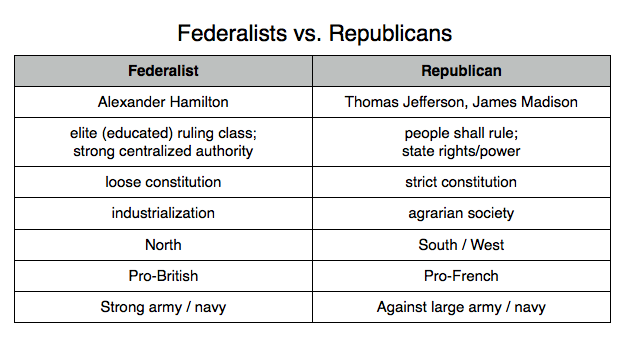Hamilton as Secretary of the Treasury
1. Assumption of State Debts : “assumption bill”
2. Creation of National Bank (passed & set in 1791)
3. Tariffs on imports (to protect internal industries)
4. Excise tax on alcohol -> Whiskey Rebellion
1. Assumption of State Debts : “assumption bill”
2. Creation of National Bank (passed & set in 1791)
3. Tariffs on imports (to protect internal industries)
4. Excise tax on alcohol -> Whiskey Rebellion
[Cotton gin 1793]
- Eli Whitney invented Cotton Gin : “interchangeable parts”
- Eli Whitney invented Cotton Gin : “interchangeable parts”
[Turnpike Era 1793]
- corporation constructed a toll road
- charged passengers fees
- successful : gov. aid (interstate commerce)
- difficulties : technology = elevation, difficult mobility of supplies
- corporation constructed a toll road
- charged passengers fees
- successful : gov. aid (interstate commerce)
- difficulties : technology = elevation, difficult mobility of supplies
[America’s Neutrality]
- French Revolution : Federalists opposed it while Republicans praised it
- Citizen Genet (1793) : France sent Edmond Genet to SC to win Americans’ supports for the France in French-Anglo War
- w/out U.S. consensus, tried to enlist Americans
- Washington asked France to take him back (and Jefferson had to agree Genet had gone off the boundary)
- Jay’s Treaty (1794 / ratified in 1795) : With Britain
- agreed to: 1) leave the forts in the Northwest Territory (along Great Lakes); 2) expanded trades
- couldn’t agree to: Britain stopping & searching American ships
- People didn’t like this treaty because it didn’t do much
- Pinckney’s Treaty (1795) : With Spain
- Spain gave America rights to navigate the Mississippi and access to New Orleans to unload cargoes
- agreed to fix northern boundary of Florida along 31st boundary
- no Indian raids across the border
- French Revolution : Federalists opposed it while Republicans praised it
- Citizen Genet (1793) : France sent Edmond Genet to SC to win Americans’ supports for the France in French-Anglo War
- w/out U.S. consensus, tried to enlist Americans
- Washington asked France to take him back (and Jefferson had to agree Genet had gone off the boundary)
- Jay’s Treaty (1794 / ratified in 1795) : With Britain
- agreed to: 1) leave the forts in the Northwest Territory (along Great Lakes); 2) expanded trades
- couldn’t agree to: Britain stopping & searching American ships
- People didn’t like this treaty because it didn’t do much
- Pinckney’s Treaty (1795) : With Spain
- Spain gave America rights to navigate the Mississippi and access to New Orleans to unload cargoes
- agreed to fix northern boundary of Florida along 31st boundary
- no Indian raids across the border
[Whiskey Rebellion 1794]
- Western Pennsylvania refused to pay excise tax on alcohol (including Whiskey) -> terrorizing tax collectors
- Federal government sent militia men (led by Washington) and crushed the rebellion
- Western Pennsylvania refused to pay excise tax on alcohol (including Whiskey) -> terrorizing tax collectors
- Federal government sent militia men (led by Washington) and crushed the rebellion
[New States]
- Vermont (1791)
- Kentucky (1792)
- Tennessee (1796)
side notes : did not set clear boundary between Indians
- Vermont (1791)
- Kentucky (1792)
- Tennessee (1796)
side notes : did not set clear boundary between Indians

